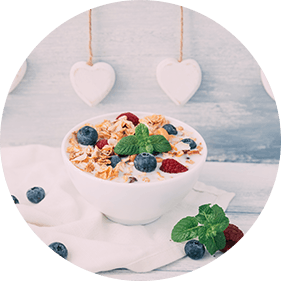Soluble vs. Insoluble Fiber: Why You Need Both
Learn the difference between soluble and insoluble fiber.


Fiber is an important part of a balanced diet and promotes heart and digestive health. But did you know that there are actually two types of fiber, and that it’s a good idea to consume both for a healthy diet? Learn about the benefits of soluble and insoluble fiber, where to find them and how to supplement a balanced diet with extra fiber.
What Is Soluble Fiber?
There are two types of fiber—soluble and insoluble—that are required for a healthy diet.1
Soluble fiber dissolves in water and forms a gel that slows digestion.2 This type of fiber has numerous health benefits, including the ability to help lower blood cholesterol and glucose levels.2 Eating soluble fiber may make you feel more full, which may help with weight management.2 However, not all soluble fibers are the same. Certain types of fiber have different benefits such as prebiotic effects, helping to maintain heart health, or even helping you feel fuller longer.
What Is Insoluble Fiber?
Insoluble fiber does not dissolve in water and cannot be digested.2 However, this type of fiber is important to health because it can help you maintain regularity.2 Thus, insoluble fiber can help you feel comfortable throughout the day. Combining soluble and insoluble fiber can help you get the greatest health benefits from a high-fiber diet.2
Sources of Soluble and Insoluble Fiber
Fortunately, many foods that are tasty to eat are also high in fiber. Vegetables, legumes and whole grains are major sources of fiber.2 Often these foods can contain both soluble and insoluble fiber.
Legumes are a great source of soluble fiber, especially beans. Fruits, vegetables and seeds are also good sources of soluble fiber.1
Insoluble fiber is found in wheat bran, vegetables and whole grains.1
What the Research Says About Soluble and Insoluble Fiber
Many studies show that consuming soluble and insoluble fiber can potentially help reduce your risk of developing coronary heart disease (CHD).4 In addition, the FDA also claims that individuals who consume high-fiber and low-saturated fat diets have a decreased risk of CHD.4
In addition to CHD, many studies have been conducted on the relationship between diabetes, obesity prevention and dietary fiber.4 Dietary fibers have been found to help lower blood sugar spikes and reduce insulin levels after eating, potentially because they slow down or reduce the absorption of sugar in the intestines.4 Dietary fiber could also help with weight management by reducing energy (calorie) absorption without removing any important nutrients from the diet.4
Fiber Supplements Can Help
Experts recommend that you eat 21 to 38 grams of fiber each day, with 6 grams being comprised of soluble fiber.4* Although you can take your fiber any time of the day, there is some evidence that fiber at breakfast could promote healthy weight loss.3 Having a breakfast with enough fiber is a good start to the day.3
People who are busy and active may miss their daily requirements for fiber. Fortunately, there are fiber supplements available to help maintain a balanced diet. Fiber supplements like Benefiber are made of soluble fiber, which have numerous health and weight maintenance benefits.
Fiber supplements, which dissolve in water, may be taken with non-carbonated beverages. This method is a convenient way to increase daily fiber intake. Fiber supplements taken along with nutritious meals and snacks can help support a balanced diet.
*According to the Institute of Medicine, it is recommended that, in adults 50 or younger, women should consume 25 grams of fiber daily and men 38 grams. In adults 51 or older, women should consume 21 grams of fiber daily and men 30 grams.
Show References
- Soluble vs. insoluble fiber Information. Mount Sinai. New York. 20 Aug. 2024. Web. https://www.mountsinai.org/health-library/special-topic/soluble-vs-insoluble-fiber.
- "Dietary Fiber: Essential for a Healthy Diet." Mayo Clinic. 22 Sept. 2015. Web. http://www.mayoclinic.org/healthy-lifestyle/nutrition-and-healthy-eating/in-depth/fiber/art-20043983.
- Hu, X., J. Gao, Q. Zhang, Y. Fu, K. Li, S. Zhu, and D. Li. "Soy Fiber Improves Weight Loss and Lipid Profile in Overweight and Obese Adults: A Randomized Controlled Trial." Molecular Nutrition & Food Research. U.S. National Library of Medicine, Dec. 2013. Web. https://www.ncbi.nlm.nih.gov/pubmed/23881774.
- Effects of Dietary Fiber and Its Components on Metabolic Health. PMC. https://www.ncbi.nlm.nih.gov/pmc/articles/PMC3257631/. Accessed 8/20/24.
Nourish the Goodness Inside
Benefiber is an easy way to add fiber to your life.
$1.50 OFF BENEFIBER







